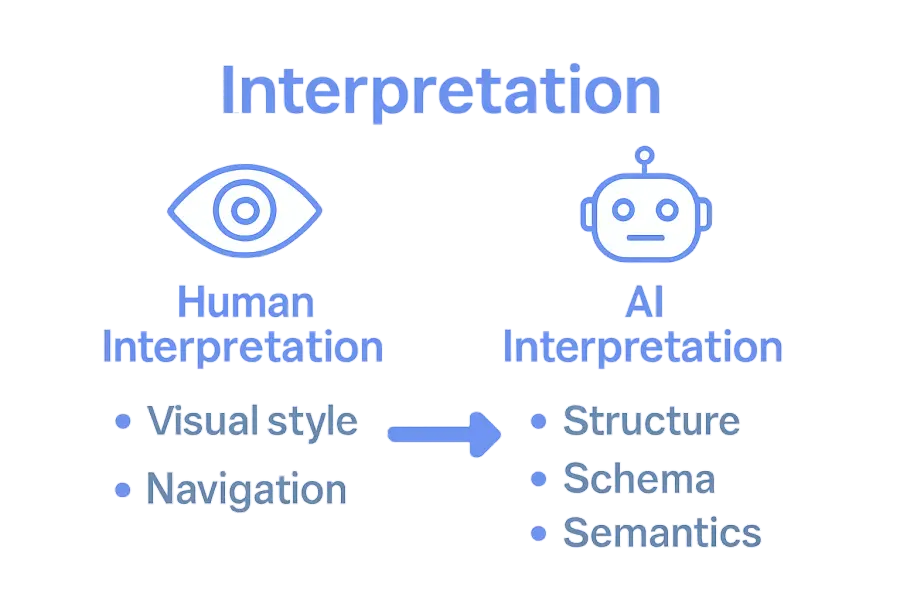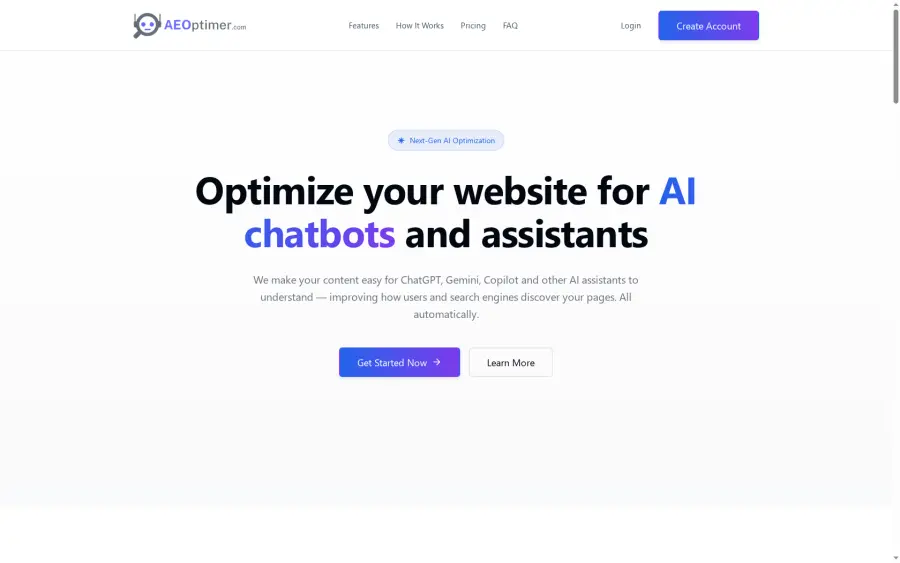How AI Interprets Websites: Complete Guide for 2025

More than 80 percent of modern websites rely on artificial intelligence to analyze their content and improve visibility. As AI becomes central to how search engines and digital tools understand information, clear website structure is no longer just for humans. Learning how AI decodes web pages reveals new ways to make your site stand out in an increasingly competitive online world.
Table of Contents
- Defining How AI Interprets Websites
- Key Technologies in AI Website Analysis
- Structured Data and Content Optimization Methods
- Common AI Crawling and Ranking Challenges
- Best Practices for AI-Ready Website Enhancement
Key Takeaways
| Point | Details |
|---|---|
| AI Website Interpretation | AI uses machine learning to analyze and understand web content, focusing on context, structure, and semantics. |
| Structured Data Importance | Implementing structured data, such as schema markup, enhances AI understanding and search engine visibility. |
| Crawling and Ranking Challenges | Dynamic content and complex rendering can impede AI crawling; proactive measures can mitigate these issues. |
| Best Practices for Optimization | Websites should adopt a semantic structure, rich metadata, and maintain updated content for improved AI discoverability. |
Defining How AI Interprets Websites
AI website interpretation is a complex process of computational pattern recognition and semantic understanding. Machine learning algorithms systematically analyze web content, transforming unstructured digital text into meaningful insights that can be processed and understood by intelligent systems. Augmented Analytics employs advanced natural language processing techniques that enable AI to decode website content with remarkable precision.
The interpretation process involves multiple sophisticated layers of analysis. First, AI systems perform structural parsing, breaking down website content into discrete elements like headings, paragraphs, images, and metadata. Then, machine learning models apply contextual understanding, identifying relationships between different content segments. These models can recognize linguistic nuances, semantic connections, and underlying meaning beyond simple keyword matching.
Key elements that AI considers when interpreting websites include:
- Content relevance and topical coherence
- Semantic relationships between different sections
- Structural organization of information
- Metadata and schema markup
- Contextual links and references
- Language complexity and writing style
By leveraging advanced AI search technologies, websites can optimize their content to become more discoverable and comprehensible to machine learning systems. The goal is creating digital content that speaks both to human readers and intelligent algorithms, bridging the communication gap between human creativity and computational understanding.

Key Technologies in AI Website Analysis
AI website analysis leverages a sophisticated array of computational technologies that transform how digital content is understood and processed. Semantic Scholar demonstrates the power of advanced AI technologies, utilizing natural language processing and machine learning to extract meaningful insights from complex digital content. These technologies go beyond traditional keyword matching, enabling intelligent systems to comprehend context, semantics, and nuanced information structures.
The core technologies driving AI website analysis include:
- Natural Language Processing (NLP): Enables machines to understand human language
- Machine Learning Algorithms: Continuously improve content interpretation
- Deep Learning Neural Networks: Recognize complex patterns and relationships
- Semantic Analysis: Extract underlying meaning and context
- Knowledge Graph Integration: Connect related information across different sources
Copyleaks showcases another critical aspect of AI website analysis through advanced content evaluation techniques. These technologies can detect subtle patterns, semantic relationships, and contextual nuances that traditional analysis methods might miss. By combining multiple computational approaches, AI systems create a comprehensive understanding of website content that goes far beyond simple text scanning.
Website owners and content creators can leverage how to audit websites for AI to optimize their digital presence. The goal is developing content that is not just readable by humans but also comprehensible and analyzable by sophisticated AI systems, ensuring maximum digital visibility and understanding.
Structured Data and Content Optimization Methods
Structured data represents the foundation of effective AI website interpretation, providing a systematic approach to content organization that enables intelligent systems to understand and process digital information more efficiently. KVY Technology highlights the critical role of natural language processing and machine learning in automated content generation, emphasizing how structured approaches can significantly enhance search engine discoverability.
Key structured data optimization methods include:
- Schema Markup: Provides explicit context about webpage content
- JSON-LD Formatting: Enables clear data representation
- Semantic HTML: Improves content hierarchical understanding
- Metadata Optimization: Enhances machine-readable information
- Content Tagging: Creates precise content categorization
The optimization process involves strategic implementation of technical and content-related techniques.
 Websites must balance human-readable content with machine-interpretable structures, ensuring that AI systems can accurately parse and understand the underlying meaning. This requires careful attention to content architecture, semantic relationships, and clear information hierarchies.
Websites must balance human-readable content with machine-interpretable structures, ensuring that AI systems can accurately parse and understand the underlying meaning. This requires careful attention to content architecture, semantic relationships, and clear information hierarchies.
Website owners can leverage web page optimization strategies to ensure their content remains both user-friendly and AI-discoverable. The ultimate goal is creating digital content that seamlessly communicates across human and artificial intelligence platforms, maximizing visibility and comprehension in an increasingly complex digital ecosystem.
Common AI Crawling and Ranking Challenges
Web crawling and ranking represent complex technological challenges that significantly impact how AI systems discover and evaluate online content. arXiv research provides a systematic review highlighting the intricate obstacles AI encounters during web data collection and analysis, revealing the sophisticated challenges inherent in digital information processing.
The most prevalent challenges in AI crawling and ranking include:
- Dynamic Content Generation: Websites with frequently changing content
- Complex JavaScript Rendering: Difficulty interpreting client-side scripts
- Infinite Scroll Mechanisms: Challenges tracking complete content
- Authentication Barriers: Restricted access to protected web pages
- Multilingual Content Interpretation: Semantic nuances across languages
- Duplicate and Syndicated Content: Identifying original sources
Technical complexity emerges from the need to simultaneously understand context, evaluate relevance, and navigate increasingly sophisticated web architectures. AI systems must constantly evolve their crawling strategies, developing more advanced parsing techniques that can penetrate increasingly complex digital environments. These challenges require continuous algorithmic refinement to maintain accurate and comprehensive web indexing.
Website owners can proactively address these challenges by making websites AI discoverable, ensuring their digital content remains accessible and interpretable across diverse AI platforms. Understanding these technical constraints helps create more transparent, machine-friendly web experiences that bridge human creativity with artificial intelligence’s analytical capabilities.
Best Practices for AI-Ready Website Enhancement
Website optimization for artificial intelligence requires a strategic, multifaceted approach that goes beyond traditional content creation. KVY Technology emphasizes the critical importance of integrating AI tools for automated content generation and optimization, highlighting the evolving landscape of digital discoverability.
Key best practices for AI-ready website enhancement include:
- Semantic Structure: Implement clear, hierarchical content organization
- Rich Metadata: Provide comprehensive, descriptive page information
- Consistent Content Updates: Maintain fresh, relevant digital assets
- Cross-Platform Compatibility: Ensure seamless rendering across devices
- Multilingual Support: Create content accessible to diverse AI systems
- Performance Optimization: Minimize page load times and technical barriers
The technical nuance of AI website enhancement demands a holistic approach that balances human readability with machine interpretability. Websites must develop adaptive strategies that anticipate the increasingly sophisticated algorithms used by AI crawlers and indexing systems. This requires continuous monitoring, strategic content architecture, and proactive technical refinement.
Website owners can further improve their AI discoverability by creating AI-friendly website content, ensuring their digital presence remains dynamic, accessible, and intelligently structured for emerging technological landscapes.
Boost Your Website’s AI Visibility Effortlessly
Understanding how AI interprets websites reveals just how challenging it can be to stay ahead of evolving AI crawling and ranking technologies. Many website owners struggle with dynamic content, complex JavaScript, and the need for structured data that both humans and intelligent algorithms can understand. The key to success lies in seamless content optimization that bridges human creativity with AI’s computational analysis.
aeoptimer.com is built to solve these exact challenges. Our SaaS platform automates adding structured data and AI-friendly content enhancements without changing your website’s look or requiring technical skills. By placing a small script, you enable continuous site crawling, smart content updates, and sitemap management to keep your pages highly discoverable by AI assistants like ChatGPT and Copilot. Discover how to make websites AI discoverable and expertly create AI-friendly website content all through a simple, automated system designed with your ease in mind.

Don’t let your hard work get lost in AI algorithms. Visit aeoptimer.com today to ensure your content stays visible and highly ranked in the AI-driven search landscape. Start optimizing now and watch your AI-based traffic grow with minimal effort.
Frequently Asked Questions
How does AI interpret website content?
AI interprets website content through machine learning algorithms that analyze structural elements, contextual relationships, and semantic meanings of the content. This involves processes such as structural parsing and contextual understanding, allowing the AI to derive meaningful insights from digital text.
What technologies are crucial for AI website analysis?
Key technologies for AI website analysis include Natural Language Processing (NLP), Machine Learning Algorithms, Deep Learning Neural Networks, Semantic Analysis, and Knowledge Graph Integration. These technologies enable AI systems to comprehend context, semantics, and complex information structures in web content.
What are effective structured data optimization methods for websites?
Effective structured data optimization methods include using Schema Markup to provide context, JSON-LD formatting for clear data representation, Semantic HTML for content organization, metadata optimization, and content tagging for precise categorization.
What challenges do AI systems face in web crawling and ranking?
AI systems face several challenges in web crawling and ranking, including dynamic content generation, complex JavaScript rendering, infinite scroll mechanisms, authentication barriers, multilingual content interpretation, and the need to identify duplicate and syndicated content.





